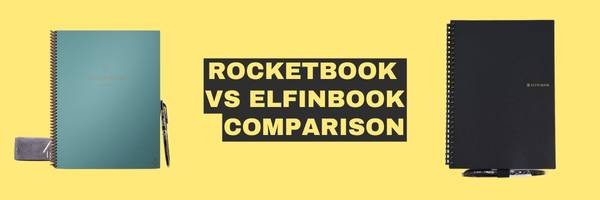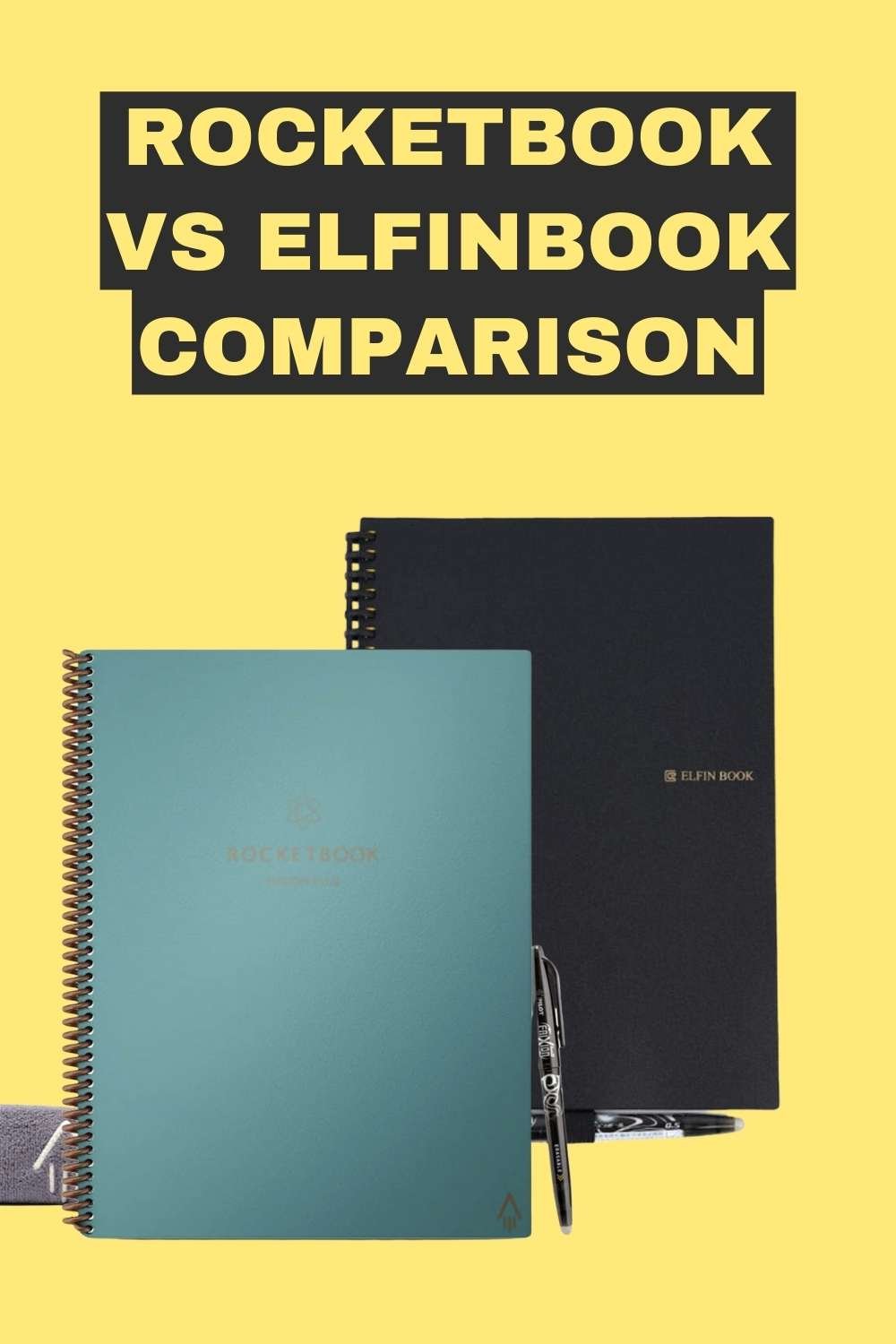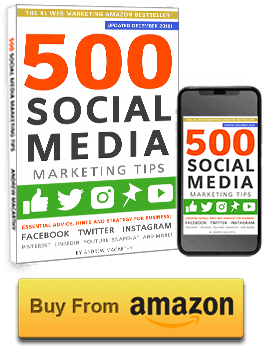Rocketbook vs Elfinbook Full Comparison: Which Is Best?
/Rocketbook vs Elfinbook - which is the best? I’m here to help!
Whether you work from home like me, are a student or teacher, or own your own business - smart notebooks are a game-changer.
Digital note-taking not only streamlines your workflow but also ensures that your ideas, tasks, and notes are always accessible and organized.
Enter Rocketbook and Elfinbook. Each boasts their unique features and advantages. But which one stands out? I’ll explain all their features below, and spoiler, there’s one clear winner.
Short on time? My top pick: Rocketbook Fusion
The Rocketbook Fusion stands out in the realm of smart notebooks, and here's a quick rundown of why:
Versatile Design:
A blend of Rocketbook's Core and Planner models.
Offers lined, dotted, and templated pages for varied uses.
Eco-Friendly:
Reusable with Pilot FriXion pens, plus many others including highlighters and even fountain pens.
Erase with a damp cloth, reducing paper waste.
Advanced Scanning:
Rocketbook's app offers quick, efficient scanning.
Auto-crop, enhance, and transcribe handwritten notes with OCR.
Cloud Integration:
Syncs seamlessly with platforms like Google Drive, Evernote, and Dropbox.
Backup and access notes from anywhere.
Durable & Portable:
Spiral binding and water-resistant pages ensure longevity.
Lightweight design perfect for on-the-go use.
Customizable Experience:
Designate symbols in the app to send notes to specific destinations.
Rocketbook vs. Elfinbook: The Ultimate Smart Notebook Showdown
How do the Rocketbook and Elfinbook stack up against each other? Let's dive in.
Page Material and Feel:
Elfinbook: The Elfinbook pages offer a more traditional feel, less plasticky, and are more akin to what you might expect from a high-quality notebook. This makes the transition from traditional to smart notebook smoother.
Rocketbook: Rocketbook's pages have a glossy texture, reminiscent of a magazine page. While this might take a bit of getting used to, the writing experience is smooth, with pens gliding effortlessly across the surface.
Both notebooks provide a consistent ink display, ensuring your notes are clear and legible. The drying time is slightly faster with Elfinbook, especially when using finer tip pens. Left-handed writers might face smearing issues due to the drying time, but right-handed users should find the experience smear-free.
Dots vs Lines:
Rocketbook: Features a grid of small gray dots, making it versatile for both writing and drawing. The grid layout is particularly useful for scale drawings. The Rocketbook Fusion also features pages and tables for planning.
Elfinbook: Uses traditional ruled lines, which might be more familiar for those who primarily write text. However, artists or those who sketch might prefer Rocketbook's grid system.
Binding and Durability:
Rocketbook: Uses a spiral binding, similar to many traditional notebooks. This ensures the pages flip easily and stay intact.
Elfinbook: Employs plastic rings for binding. While this allows for rearranging pages, it can sometimes lead to pages getting stuck or the rings unsnapping.
Erasing Pages:
Both notebooks offer the ability to erase and reuse pages, making them eco-friendly and cost-effective.
Rocketbook Everlast: Best erased using a damp cloth. The Rocketbook Wave variant allows for microwave erasing, but this method has its limitations and can wear out the notebook after about five uses.
Elfinbook: Can be erased using a damp cloth, hair dryer, or microwave. However, microwaving can sometimes cause pages to stick together.
Software:
Rocketbook: The Rocketbook app is user-friendly and efficient. With a few taps, you can scan, save, and send your notes to various platforms like Google Drive, Evernote, Dropbox, and more. The app's Optical Character Recognition (OCR) feature also allows for conversion of handwritten notes into digital text.
Elfinbook: While the Elfinbook app supports most of the platforms Rocketbook does, its process is a bit more cumbersome, especially when sending notes to multiple places. However, like Rocketbook, it also offers OCR capabilities.
Pens:
Both Rocketbook and Elfinbook are compatible with Pilot FriXion pens. These pens are affordable, versatile, and come in various colors. Both notebooks include a FriXion pen, with Rocketbook offering a .7mm pen and Elfinbook a .5mm variant.
The Rocketbook also supports a wide variety of other pens, which I have written about here.
Size Options and Variants:
Rocketbook: Offers a wider variety of sizes, from a pocket-sized Mini to a full letter-sized model. There’s also a broad selection of variants, ranging from the classic Core model to the Fusion (my top pick), to the Orbit (a legal pad) and Flip (best for ambidextrous and left-handed users).
Elfinbook: Comes in A5 and B5 sizes, with 100 pages for the A5 variant and 60 pages for the B6.
In conclusion, both Rocketbook and Elfinbook bring unique features to the table, but for my money, the Rocketbook’s plethora of compatible pens and notebook variants trump the Elfinbook’s offering.
Rocketbook vs Elfinbook: Which Is the Best Overall?
In the ever-evolving landscape of digital note-taking, the Rocketbook has emerged as a clear frontrunner. The Elfinbook has its place, but falls short in terms of notepad variants and ease of use with its app.
Among its lineup, the Rocketbook Fusion stands out as the pinnacle of smart notebooks. With its versatile design, eco-friendly features, and unparalleled cloud integration, it's more than just a notebook—it's a revolution in how we capture and store ideas.
For those seeking the ultimate tool to elevate their note-taking game, whether for work, study, or personal musings, the Rocketbook, especially the Fusion, is undeniably the top choice.
I compared the Rocketbook Core, Fusion, and Fusion Plus. You can read all about them here.
Rocketbook vs Elfinbook: Feature Comparison Table
Here’s a breakdown of the features of the Rocketbook and Elfinbook in an easy-to-read table.
| Feature/Aspect | Rocketbook | Elfinbook |
|---|---|---|
| Page Material & Feel | Glossy, book-like feel | Less plastic feel, more natural |
| Drying Time | Approx. 15 seconds for .7mm pens | Approx. 10 seconds for .7mm pens |
| Dots vs. Lines | Grid of small gray dots (good for drawing) | Ruled lines (familiar for text-only use) |
| Binding | Spiralbound (easy flipping) | Plastic rings (pages can be moved around) |
| Erasing Pages | Damp cloth; microwave (limited times) | Damp cloth; microwave; hair dryer |
| Software & App | More polished, streamlined; supports multiple cloud services | Requires multiple steps for multiple destinations; supports most cloud services except Google Photos |
| Pens Supported | Pilot FriXion pens | Pilot FriXion pens, Erasable Gel Pens |
| Size Options | Variety including Mini to full letter-sized | A5(21X14.7cm); B5(25x17.6cm) |
| Page Count | Varies by model | A5(50 Sheets/100 Pages); A6(30 Sheets/60 Pages) |
| Special Features | Advanced app features, OCR | Stone paper, up to 500 rewrites, VIP app features |
FAQs on Smart Notebooks: Your Guide to Reusable Writing
Navigating the world of smart notebooks can be tricky. Here's a quick FAQ to address some of your burning questions.
Is there anything better than Rocketbook?
While Rocketbook is a top contender in the realm of erasable notebooks, the "best" notebook often depends on individual preferences. However, in terms of popularity and features, Rocketbook, especially the Fusion model, often tops the list of best reusable notebooks.
What is the disadvantage of Rocketbook?
One of the main disadvantages some users find with Rocketbook is the drying time of the ink, which can lead to smudging, especially for left-handed users. Additionally, while it's marketed as a reusable notebook, the pages have a limit to how many times they can be erased before showing wear.
What brands are similar to Rocketbook?
Elfinbook is a notable competitor in the market of smart notebooks. There are also other products like Rocketbook, such as the Moleskine Smart Writing Set.
What are the pros and cons of Rocketbook notebook?
Pros: Affordable, multiple size options, easy-to-use app integration, and compatibility with Pilot FriXion pens. Cons: Limited erasing cycles for some models, potential smudging issues, and reliance on specific pens for best results.
Does Rocketbook last forever?
No, while Rocketbook is designed as a rewritable notepad, its pages have a limit to how many times they can be erased and rewritten. However, with proper care, it can last for a significant amount of time, making it a sustainable choice compared to traditional notebooks.
What is so special about Rocketbook?
Rocketbook stands out as a microwave erasable notebook in some models, allowing users to erase and reuse pages multiple times. Its integration with cloud services, the quality of its app, and its affordability make it a top pick in the smart book notebook category.
Want more? Check out these articles for products to help you build the best home office setup in the world:
About the Author
Andrew Macarthy has worked from home for over a decade. He is a social media consultant and the author of the #1 Amazon Web Marketing Bestseller, 500 Social Media Marketing Tips - with over 150,000 copies sold to date.












